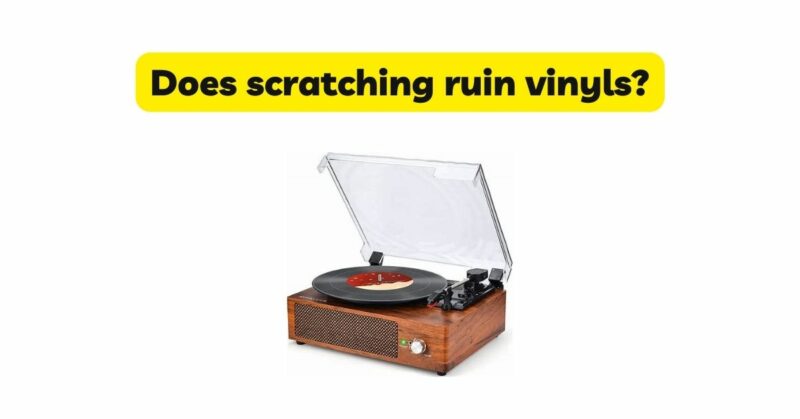Vinyl records have a certain allure and charm that has captivated music enthusiasts for decades. However, concerns about scratches and their potential impact on the longevity and quality of vinyl records persist. This article aims to delve into the question: Does scratching ruin vinyl records? By exploring the nature of scratches, examining their effects on sound quality and playability, and considering the resilience of vinyl as a medium, we can gain a better understanding of the true implications of scratches on vinyl records.
The Nature of Scratches: To determine whether scratching ruins vinyl records, it is essential to understand the nature of scratches. Scratches occur when the stylus encounters physical damage on the record surface. Scratches can range from superficial surface marks to deeper gouges in the grooves. The severity and depth of the scratch play a significant role in determining the potential consequences for the record.
Impact on Sound Quality: One of the primary concerns regarding scratches on vinyl records is their effect on sound quality. While scratches can introduce noise, pops, or crackles, their impact on sound quality depends on several factors:
a. Depth and Severity: Deep or severe scratches are more likely to cause audible distortions and disruptions in playback. These scratches can cause the stylus to jump or skip, leading to audible interruptions in the music. Shallow or superficial scratches, on the other hand, may have a minimal impact on sound quality.
b. Location: The location of the scratch within the grooves can influence its impact on sound quality. Scratches closer to the beginning of a track may be more noticeable and disruptive, while those towards the end may have a lesser effect on the overall listening experience.
c. Cleanliness and Maintenance: The cleanliness of the record and the stylus can influence the extent to which scratches impact sound quality. Dust, debris, or residue on the record surface or stylus can exacerbate the effects of scratches, leading to increased noise and distortion during playback.
While scratches can affect sound quality, it is important to note that not all scratches result in a ruined listening experience. Minor scratches and imperfections are often tolerated and may not significantly detract from the enjoyment of the music.
Playability and Skipping: Another concern associated with scratches on vinyl records is their impact on playability. Deep or severe scratches can cause the stylus to jump or skip, leading to portions of the music being skipped or repeated. This interruption can be frustrating and disrupt the intended listening experience. However, it is worth noting that not all scratches result in skipping. Superficial scratches or those that do not interfere with the tracking of the stylus may not cause skipping issues.
Resilience of Vinyl: Vinyl records, when properly cared for, are remarkably resilient. Vinyl as a medium has inherent flexibility and durability. While scratches can cause audible disturbances and affect playability, they generally do not render the entire record unplayable or irreparable. Vinyl has a certain degree of elasticity, allowing it to tolerate minor scratches without catastrophic damage. Additionally, vinyl records can often withstand repeated plays before the impact of scratches becomes noticeable.
Repair and Restoration: When it comes to scratched vinyl records, repair and restoration options exist. Various methods and techniques, ranging from DIY approaches to professional restoration services, can be employed to mitigate the effects of scratches. These methods aim to smooth out the scratches or fill them, thereby reducing their impact on sound quality and playability. However, it is important to note that not all scratches can be completely repaired, and the success of the restoration process depends on the severity and extent of the damage.
Subjectivity and Personal Tolerance: The impact of scratches on vinyl records can be subjective and varies from person to person. Some individuals may be more sensitive to the presence of scratches and the associated audible disruptions, while others may find minor imperfections acceptable or even add character to the listening experience. Personal tolerance and appreciation for the unique qualities of vinyl as a medium play a role in determining whether scratches are deemed ruinous or merely a part of the vinyl’s character.
Conclusion: While scratches on vinyl records can have an impact on sound quality and playability, the notion of them “ruining” records is subjective and depends on the severity and individual tolerance. Superficial scratches often have minimal effects, and properly cared for vinyl records can withstand minor scratches without significant deterioration. Furthermore, repair and restoration options are available for mitigating the effects of scratches. Collectors and enthusiasts should prioritize proper handling, storage, and maintenance practices to minimize the risk of scratches and maximize the longevity and enjoyment of their vinyl collections. Ultimately, the appreciation for vinyl records extends beyond their pristine condition, and scratches should be seen as a part of the record’s history and character rather than an outright ruinous factor.


